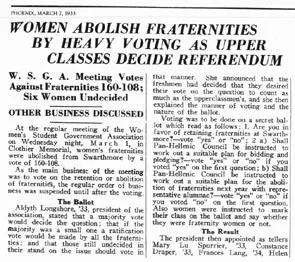1933 Sororities Abolished

In 1931, sororities could count more than three-quarters of the women students as members. But despite enjoying strong popularity, the often-exclusive organizations came under fire.
Molly Yard '33, later a president of the National Organization for Women, calls the fight to abolish the sorority system at Swarthmore her first political campaign. In a 2000 interview, she described the discrimination against Jewish students that prompted her action: one student was barred from Chi Omega, Yard's older sister's sorority; another was refused by Yard's sorority, Kappa Alpha Theta.
"We carried the matter all the way to the national office," Yard said. When they said no, she stated, "That did it. We organized a campaign."
The Phoenix referred to the several months that followed as the "women's fraternity agitation." And the agitation only increased after the vote, run by the Women's Student Government Association, was taken.
"When we voted to abolish the system, all hell broke loose," Yard said. "Alums descended on the College. Because of the pressure, President Aydelotte decided to put off the decision for a year. I remember how furious I was at him. I ran to his door and banged on it, and he said, 'What's the matter, Molly? Are you afraid to take a vote again next year?' And I said, 'Of course not.'"
The next year, an even greater number voted to uphold the ban. "That," Yard said, "was how it was done."
Eighty years later, interest among female students for a sorority on campus returned. In 2012, a small group called Not Yet Sisters was approved as a student organization by the Student Activities Committee and petitioned the Dean's Office to pursue a charter with a national sorority. They ultimately chose to bring back Kappa Alpha Theta, whose Alpha Beta chapter was first chartered at the College in 1891.



